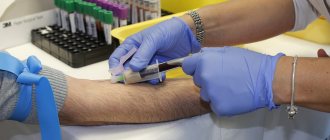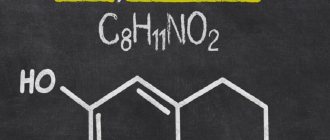- July 5, 2018
- Psychiatry
- Evdokimenko Kristina
Depressed mood, which everyone experiences from time to time, is a normal part of life. But it happens that emptiness and despair come, and they do not go away for a long time - this can be depression, a dangerous condition for a person as a whole. This is not just a temporary mood disorder; depression prevents a person from living happily and enjoying every moment. In this case, the patient is no longer interested in friends, relatives, favorite hobbies or work. A person begins to feel unnecessary to absolutely everyone and this world; in his thoughts there are notes that perhaps it would be better for everyone if he did not exist at all. But if there is support and help from a caring person, then this condition can be dealt with, and, probably, the disease will soon recede. To fight this disease, you must first be aware that you are in this condition. We will introduce you to the signs, symptoms, causes and possible treatment for this disease, because knowing as much as possible about the problem is the first step to successfully overcoming it.
What is depression?
Speaking from an official point of view, depression (from the Latin depression - suppression) is an emotional state of a person in which he experiences depression, melancholy and deep despair. People in this state lose their willpower, their ordinary everyday desires and needs disappear. Quite often, thoughts arise that perhaps I am to blame for the problems and difficulties occurring in the lives of loved ones and relatives. Helplessness in the face of any troubles is the first sign that you are already in this state. It seems to you that there are no prospects in life, everything is going down the drain, and no one needs you. What is severe depression? A mental state that can lead a person to the idea of saying goodbye to his life by committing suicide. Therefore, timely intervention by a specialist very often turns out to be necessary and the only salvation.
Types of depression
Depression, depending on the underlying cause, can be of two types:
- endogenous depression;
- exogenous depression.
Endogenous depression appears when there are disorders of neuropsychic processes and mechanisms.
Chronic fatigue, hormonal disorders, heredity, endometriosis, etc. can contribute to this pathology. Exogenous depression is formed in a person under the influence of external factors. Such factors include various diseases, poisoning, stress, shocks, conflicts, neuroses and many others. If the stimulus stops, the depression usually goes away on its own.
Exogenous depression is also called reactive depression. This depression begins as the body’s reaction to a certain traumatic factor. The patient cannot independently solve the problem that has arisen and does not notice his condition.
There is also seasonal depression, which occurs in people living in countries with cold temperatures and low climates. Malnutrition, separation from a loved one, lack of work or a new job can lead to depression.
Endogenous depression
- “Endogenous” (originating from within) implies that there is no discernible external cause for depression.
- It was believed that this type of depression is often inherited by children
- It was believed that this form of depression is characterized by a large number of somatic symptoms (sleep and appetite disturbances, poor concentration and memory, loss of interest in previously loved activities).
- Experts believed that this form of depression would most likely respond well to treatment with antidepressants.
Exogenous depression
- “Exogenous” implies that the depression is due to some external stress occurring in the patient's life.
- It was believed that the risk of this type of depression depends more on severe external circumstances and stress than on hereditary factors.
- Symptoms were thought to be characteristic of restless sleep and long morning awakenings (as opposed to early awakenings in endogenous depression)
- It was initially argued that patients with reactive depression responded less well to antidepressants.
Psychotic and neurotic depression
This differentiation was based on the assumption that patients with depression can be divided into two groups based on their symptoms.
This classification corresponded almost exactly to the endogenous and exogenous classification, with the “psychotic” group being similar to the “endogenous” group.
The use of the term "psychotic" is extremely confusing because it usually refers to the presence of certain symptoms (hallucinations and delusions) that are not necessarily present in "psychotic depression" as defined in this classification.
Major and episodic depression
The terms major and episodic depression are inherently misleading.
The use of the term “episodic” has often led to a lack of treatment for patients with so-called “minor depression.”
The term "profound" is also misleading because it does not necessarily mean "severe" illness.
Reasons why this classification no longer applies
- Patients with endogenous depression usually also suffer from a stressful event before the onset of their illness.
- Exogenous depression is most likely inherited in the same way as endogenous depression.
- Patients cannot be divided into different categories based on symptoms: patients with physical symptoms are also very prone to mental symptoms: anxiety and restlessness
- Exogenous and endogenous depression respond to antidepressants in the same way.
However, many experts are still confident that:
- Each person may have a different degree of hereditary risk for depression and tolerance for the life stresses that cause the disease. It is important to consider both social and environmental factors and genetics when trying to understand why a particular person develops depression at a particular point in time.
- For example, if a person develops depression due to a lot of stress, it would be advisable to help him cope with it. It would also be appropriate to treat depression with medication or psychotherapy.
- Different people have different symptoms, some have stronger physical symptoms and some have more mental symptoms. Both types of symptoms are responsive to antidepressants, although there is evidence to support the use of certain types of antidepressants for depression with significant anxiety symptoms, such as selective serotonin reuptake inhibitors (SSRIs).
Causes of mental condition
Endogenous depression is a very complex disease, since the cause is within the person. Its occurrence can begin due to a lack of hormones in the body - serotonin, norepinephrine, dopamine. If they are produced in insufficient quantities in the body, then the person begins to worry too much both for any reason and without it, there is a feeling of depression, severe apathy, and the worthlessness of his existence is felt.
The causes of endogenous depression can be any traumatic events in life, as well as minor everyday stressful situations that a healthy person could cope with very quickly (for example, someone was rude in a public place). In addition, such depression can occur against the background of prosperity and an ideal life.
Possible reasons
Let's look at what can provoke the occurrence of endogenous depression.
- Genetic predisposition. If your closest relatives are diagnosed with this disease, then there is a high probability that you may develop it too.
- Endocrine pathologies. A lack of certain hormones leads to a lack of joy in life.
- Pathologies of the central nervous system. This condition may be a consequence of neurology in early childhood.
- Accentuation of character. The development of this depression is facilitated by excessive responsibility, pedantry, self-doubt, suspiciousness, and increased anxiety.
- Progression of chronic diseases.
- Uncontrolled or long-term use of drugs that affect the psyche.
- The result of excessive physical or intellectual stress.
- Having irregular working hours.
- The negative impact of certain events on the human psyche.
Depression in Teens: What You Need to Know
Today, everyone is familiar with the concept of depression (depression, negative attitude towards life), and for each person it occurs differently. You also need to know what teenage depression means (a condition that characterizes the entire transition period from childhood to adolescence). Most often, it is teenagers who feel emptiness, uselessness, alienation and insignificance in this huge world. This, in turn, causes sleep disturbances and deteriorates physical health. But it directly depends on peace of mind and balance.
Adults mistakenly believe that depression in adolescents is a common condition that characterizes any boy or girl, so there is no need to treat it, but just wait until it goes away on its own. This attitude towards depression is fundamentally wrong, because such a condition is a real malaise, and if it is not treated, then eventually fatigue will take over. And the consequences of depression can be very different, it can be a serious mental disorder, and even schizophrenia. The worst thing about teenage depression is that their psyche during this period is extremely unstable and any push can lead to fatal consequences. The most effective way to avoid or cure this disease is to communicate not only with peers, but also with adults.
The most dangerous is youthful endogenous depression, which is characterized by constant thoughts of suicide. Such a state can arise without a reason, meaning that anything can provoke its appearance, for example, a word spoken at the wrong time and in the wrong tone. This form of depression may indicate the presence of a serious mental illness, MDP, which requires psychological intervention and medication. It is important to remember that psychotherapy for endogenous depression at home will not help. This condition has not only extreme forms of development. So this can also include melancholy, a depressed state that is observed in people who have lost the meaning of life and interest in everything that happens.
Consider below the signs of endogenous depression in adolescents:
- unstable nervous system due to hormonal imbalances in the body;
- psychological stress (for example, finding your place in life);
- family difficulties (divorce of parents, quarrels, presence of alcoholics in the family);
- cruelty of a parent towards a child;
- low self-esteem, more often in girls;
- deep feelings about first love;
- indecisiveness and self-doubt;
- poor performance at school.
Treatment
Psychotherapy is the most effective method in the fight against depression
Some experts are convinced that endogenous depression cannot be cured. But others argue that this can be done, even if the most severe form occurs. A prerequisite is the presence of an experienced psychiatrist.
It is important that the therapy is comprehensive.
- Treatment with antidepressants. Since this condition is a type of depression, you cannot do without these medications that help improve your mood. A specialist can also prescribe anticonvulsants, anxiolytics to help counter fears, medications to normalize mood, and antipsychotics to help reduce aggression.
- Homeopathic methods. In a situation where the disease was diagnosed at an early stage, you can get by with easier remedies, for example, Nervohel, Gomaccord. But when taking homeopathy, the course of treatment is longer.
- Traditional medicine. Some herbs are known to be effective in combating this problem. At the initial stage of the disease, the use of decoctions and infusions is quite justified. It is also recommended to consume vegetables and fruits with bright colors. You should find out from your doctor which herbs are suitable for you, because there is always a risk of individual intolerance.
- Phototherapy. Treatment using light, which stimulates the secretion of happiness hormones.
- Sleep deprivation. The method is based on a change in the activity of mediators. The essence of this method is to create a stressful situation that helps restore emotional tone.
- Psychotherapy. Mandatory in the case of a running condition. A psychotherapist identifies the true cause of this disorder, teaches how to act correctly in a given case, and helps to live through what caused depression.
It is important to understand that the symptoms of endogenous depression may differ from person to person. Therefore, the approach to treatment will be different.
How successful the therapy will be directly depends on the following factors:
- at what stage was the patient at the time of contacting the doctor;
- his individual characteristics;
- desires to get rid of depression;
- positive attitude.
You need to understand that you are unlikely to be able to cope with depression on your own. It is also very important to have a close circle that could provide support.
Endogenous depression test
This condition has a different name, it is proper depression, clinical, severe. It is caused by unspecified brain disorders, as well as hormonal or nervous breakdown. The following symptoms should appear at the same time:
- depressed mood almost all day;
- lack of interest and ability to experience pleasure;
- weight gain or loss;
- excessive sleepiness;
- poor body coordination;
- insomnia;
- fatigue;
- increased feelings of guilt and loss of self-worth;
- problems with memory and concentration;
- constant thought of the hopelessness of the situation.
Interpretation of results:
- if you find more than 7 signs, you may have depression, so you need to consult a doctor;
- If there are less than 7 signs, you react poorly to stress.
Prevention
A person who is constantly in a favorable psycho-emotional environment does not need additional preventive measures. A mentally healthy person who is not constantly in a chronic state of stress does not need to take psychotropic medications.
Psychiatrists recommend taking sedatives to help stabilize the patient’s emotional state. If necessary, a person with an anxiety disorder can consult a psychologist. The specialist will help develop resistance to stress and find solutions to life problems that regularly cause the patient’s mood to deteriorate.
In addition to professional help from a specialist, a person with an anxiety disorder should adhere to a healthy lifestyle. The main aspects of a healthy lifestyle include:
- Proper nutrition. The diet should consist of fresh vegetables and fruits rich in minerals.
- Complete cessation of smoking and alcohol. Tobacco products and alcoholic beverages have a detrimental effect on the nervous system.
- Categorical refusal of any narcotic substances. Self-selected psychotropic medications should not be taken.
- Emotional balance. Stress, worries and worries must be avoided.
- Acceptable physical activity. The load must be alternated with rest.
With the secondary appearance of an endogenous disorder, the doctor may prescribe not only sedatives, but also stronger medications.
Diagnostics
In addition to the conversation, which is aimed at identifying the causes of the disease (stress factors, traumatic and other situations), endogenous depression is diagnosed. The doctor may also send you for an examination, which should identify factors that provoke the disease. This includes anemia, changes in hormone levels, and bad habits.
Examination methods that relate directly to depression do not carry anything terrible. The following can be used:
- Carroll test - dexamethasone test - monitoring the level of cortisol in urine and blood after administration of dexamethasone.
- Serious disturbances in sleep phases are monitored (REM - the phase that occurs after 90 minutes in a normal state, “creeps forward” with this type of depression). There is also jet lag.
After diagnosing endogenous depression and identifying the source of the problem, a consultation with a psychotherapist is prescribed, who is obliged to select the optimal treatment for the patient.
Mental state symptoms
Below we will look at the symptoms of endogenous depression in order to identify the root of the problem in time and undergo a course of treatment.
General depression. The mood of a sick person is practically independent of the events that happen around him, be it good news or unpleasant news. All-consuming melancholy often reaches such a degree that it is almost comparable to physical pain. A person feels and understands that previously he could empathize and show similar feelings, whereas now there is only emptiness in his soul. Mood can fluctuate depending on the time of year. In spring or autumn, people are especially often tormented by attacks of bad mood. Sometimes in the evening the mood may improve, but not for long; in the morning it usually drops to a critical level.
Slow movements. As a rule, it becomes more and more difficult for the patient to physically move quickly. It may even freeze in one position, not seeing the point in further movements or simply not wanting to move. In the morning he feels so weak that he cannot even get out of bed.
Slow thinking. It takes a very long time for any information to reach a person; he needs more time to understand, comprehend the question and answer it. He is unable to concentrate properly and his attention and concentration are deteriorating. A person can hardly solve even the simplest problems, can spend a long time searching for words before saying something, and finds it difficult to create a plan of action.
Chronic fatigue. A person cannot fall asleep for a long time in the evenings, sleeps poorly and is anxious. When he wakes up, he feels groggy, sleepy during the day, dizzy and tired even after performing light physical activities. Pain in the joints and muscles is often observed, chronic diseases are exacerbated, intestinal function is disrupted, and women experience irregularities in the menstrual cycle.
Guilt. A person in such a state always feels guilty or even sinful, a being incapable of anything. He often asks himself questions: “Why was I born?”, “Why am I so unhappy and unlucky?”, “Why do others have everything, but nothing for me?” This causes a person’s self-esteem to drop sharply.
Decreased or increased appetite. A sick person begins to eat more than usual or, conversely, eats practically nothing at all. Often indulges in unhealthy and sweet foods.
Feels psychopathic sensations without somatic pathologies. Describes his feelings: “A tingling feeling in the chest,” “A lump in the throat.” There are pains in the stomach and muscles.
Thoughts about suicide. Attempts to commit suicide. It is important to note the non-demonstrative behavior. Such patients, as a rule, deliberately do not tell anyone that they are likely to commit suicide. But if they decide on it, then they act for sure. Since they feel severe physical fatigue and have no desire to do anything, this often saves them.
Attention! For endogenous depression, antidepressants should not be taken without medical advice and, in principle, self-medication should be practiced. The risk of increasing physical activity without lifting your mood increases. There are cases when, when self-medicating, patients, having taken antidepressants and feeling stronger, commit suicide.
Symptoms
Typical endogenous depression is represented by the Kremelin triad - a classic triad of main symptoms: depressed mood, slow speed of thinking, motor retardation.
- The leading symptom and specific sign of this disorder is hypothymia - pathological vital melancholy. This protopathic nature of melancholy is inseparable from the physical sensations experienced by the patient and brings severe bodily suffering. Many people with the disorder can pinpoint their sensations to a specific area (usually the chest, head, neck). Moreover, patients clearly differentiate the sensation they experience from pain characteristic of somatic diseases and from experiences associated with real causes.
- A characteristic primary symptom is ideation (mental) inhibition. Even being in an emergency, extremely responsible situation, the patient is not able to quickly make the necessary decision, accelerating the thought process through an effort of will.
- With endogenous depression, motor retardation looks characteristic: the patient develops a peculiar facial expression, the so-called “melancholic face ,” which gives an expression characteristic of older people. Often motor inhibition reaches its maximum degree of numbness when the patient is in a depressive stupor. Occasionally, against the background of complete lethargy, patients experience a sudden, inexplicable and uncontrollable attack of despair, accompanied by intense excitation of motor skills, up to the risk of self-harm.
- During a depressive episode, the phenomena of depersonalization and anhedonia often appear. Many patients note the appearance of a painful sensation in which there are no emotions or desires and a feeling of change in one’s own “I” arises. Derealization of what is happening often occurs: patients perceive what is happening as unreal, gloomy, dim, and there is a feeling of time slowing down.
Although a pronounced depressed mood may be accompanied by secondary (affectogenic) signs - delusional ideas of depression, in people suffering from endogenous depression, the prevailing belief in their guilt, insignificance, and hopelessness of the future. This disorder brings into public view the most important human concerns: concerns about healing the body, saving the soul, and material wealth. These primary fears form typical delusional manifestations: hypochondriacal ideas, thoughts of sinfulness, ideas of self-blame and self-abasement.
In a severe form of involutional melancholia, a stereotypical anxious-delusional syndrome is clearly manifested: depressed mood, gloomy state, anxious psychomotor agitation, panic fear, verbal illusions, delusions of condemnation. Without adequate treatment, the formation of irrational phobic anxiety occurs with incessant anxiety, a constant excited state, and various manifestations of delusional experiences appear in the form of the inevitability of punishment and death, hypochondriacal moods, and ideas of suicide. Characteristic hypochondriacal delirium is distinguished by its special fantasy whimsicality, absurdity and illogicality of content.
As a rule, having reached its peak, endogenous depression provokes the formation of a mental defect called “depressive weakness,” which is characterized by a decrease in mental and motor activity, constant depressed mood, a decrease in emotional and sensitive resonance, and various disorders in the intellectual sphere.
Melancholic depression affects a person’s supply of vitality and energy, and awareness of this fact causes the person the greatest anxiety. Vital symptoms include:
- excessive fatigue;
- severe apathy;
- inability to exercise volitional efforts in the usual volume;
- sleep disorders: waking up too early, alternating with problems falling asleep;
- disturbances of appetite and disorders in the digestive system: lack of appetite or, conversely, excessive appetite, constipation, nausea, weight loss or gain;
- problems with concentration;
- painful sensations of a somatovegetative nature: “pressing” or “squeezing” pain in the chest, neck, head;
- lack of sexual desire, loss of libido, inability to achieve orgasm;
- feeling of irrational fear, panic attacks;
- mood swings depending on the time of day.
This disorder is characterized by a decreased response to ongoing events, detachment from the surrounding reality, and unresponsiveness to information from the outside. In the physiological aspect, a decrease in reactivity is manifested in the absence of appropriate reactions after taking standard doses of medications.
What treatment is effective?
The main type of treatment for endogenous depression is the use of medications. Antidepressants are most often used. The prescription of a drug is usually based on the severity of the observed symptoms. The most effective and with minimal side effects are the following modern antidepressants: Sertraline, Fluvoxamine, Tsipramal, Fluoxetine.
When taking medications for endogenous depression, the opposite formation of symptoms occurs. It must be remembered that after 2-3 weeks from the start of treatment, motor retardation will go away, but low mood and bad thoughts about one’s own guilt mixed with suicidal thoughts can still be observed. Therefore, this period is considered the most dangerous in terms of attempts to die. At this time, the patient needs especially careful care; it is better to place him in a hospital so that the patient is under the constant supervision of doctors.
To the question whether endogenous depression can be cured, we will answer you that yes. But this will take more than one year and more than one medication. You will have to take antidepressants for a long time (for several months, or maybe even years). It is forbidden to abruptly stop taking medications, as this may provoke a return of symptoms of the disease. There is another group of drugs that are used both for treatment and for preventive therapy, especially within the framework of manic-depressive psychosis - mood stabilizers. This group of drugs includes Lamotrigine and Finlepsin. With long-term use of mood stabilizers, mood is stabilized, the development of depressive episodes is prevented, and even if they suddenly arise, they are not so severe.
Psychotherapy can also be used, but only as an addition to drug treatment. Psychotherapy sessions are aimed at solving existing problems and conflicts.
Exogenous and endogenous depression
At the moment, there are two types of depression: endogenous and exogenous. Endogenous depression is caused by biological factors or genetic predisposition, in contrast to exogenous depression, where there is always an external stimulus (severe stress or a traumatic event). Nowadays it is rarely diagnosed as endogenous depression, more often as a major depressive disorder, or as clinical depression.
It was previously thought that the treatment of these two types of depression was different, but it later turned out that they can be treated in the same way - using psychotherapy and medication.
Consultation with a psychologist
However, a 2012 study found that there are different pathways in the brain that are responsible for both types of depression. While the results are early and there is still more to study, they may mean that different types of depression will be treated differently in the future.
Other treatments for depression
Treatment involves the correct selection of medications, long-term therapy with antidepressants and corrective psychotherapy, which is aimed at smoothing out character traits that provoke the development of the disease. In addition, endogenous depression is treated without drugs. Let us consider with you all the methods of treatment for this mental illness:
- Phototherapy (exposure to bright light or darkness).
- Sleep deprivation (deprivation) of either 12 or 36 hours. The cycle lasts for a month. This method is very effective, but unstable, so it is often combined with antidepressants.
- Medicines. The principle of drug therapy is as follows: monotherapy + long-term treatment (2 months - the disease is stopped, 6 months - the result is consolidated, a year for remission). Antidepressants are used.
Prevention and prognosis of the disease
With endogenous depression, it is necessary to carry out prevention first. For this, small doses of antidepressants and narmostimics are usually prescribed, of course, only after consultation with a psychiatrist. People who suffer from this mental disorder need to avoid heavy mental stress, should not work at night, it is important to avoid alcoholic beverages, drugs and try to lead a healthy lifestyle.
The prognosis of endogenous depression is not very favorable compared to another type of depression - reactive. After all, the cause of the disease is hidden deep inside the human body, so influencing the course is very difficult. However, the use of prophylactic doses of various drugs can prevent the formation of relapses of the disease, reduce their number, reduce the severity of symptoms and improve the general condition of the sick person.
Reasons for the development of endogenous depression
Poor nutrition increases the risk of developing endogenous depression
Doctors were unable to identify one reason for the development of this mental disorder. In general, it is believed that the root of endogenous depression is an imbalance in the production of neurotransmitters. The development of this disease may be associated with serotonin deficiency, impaired dopamine release, or increased levels of adrenaline and norepinephrine. An increase in adrenaline and norepinephrine is supported by symptoms of anxiety disorder accompanying endogenous depression.
Here we should take a closer look at the functions of each hormone.
Serotonin is also called the hormone of happiness. This substance has a powerful effect on the human nervous system, helping to experience vivid emotions. In addition to the ability to feel emotions, this hormone regulates cognitive abilities and cognitive abilities of a person, helping to better assimilate new information and master new skills. In addition, this substance affects motor function by affecting muscle fibers.
The main function of serotonin is to protect the nervous system from the destructive effects of stress. The lack of this hormone leads to depletion of the nervous system and contributes to the development of neurosis and depression.
Serotonin is also a powerful analgesic produced in the human body. This substance dulls the feeling of pain.
Dopamine is called the pleasure hormone. It is its lack that provokes anhedonia - the inability to enjoy life. This substance is produced in the body in response to any action associated with the anticipation of pleasure or reward. The simplest example is a significant increase in dopamine levels after a tasty meal.
Insufficient dopamine leads to decreased motivation, inaction, sadness and boredom. A person does not want to do anything because he does not expect a reward for his work.
The third neurotransmitter that shapes a person’s mood is norepinephrine. High levels of this substance make you feel negative emotions - anger, anger, anxiety. This substance actively supports the human instinct of self-preservation, since negative emotions manifest themselves mainly in dangerous situations and improves sensitivity to stimuli, thereby helping to concentrate attention. A lack of norepinephrine leads to a feeling of worthlessness, inability to refuse, and makes a person weak and weak-willed.
A decrease in the production of all major mood neurotransmitter hormones leads to the development of endogenous depression.
At the same time, there is no single reason for the development of this disorder, therefore the following are also considered factors that determine the risk of developing endogenous depression:
- lack of vitamins;
- unbalanced diet;
- comorbid mental disorders;
- chronic diseases;
- genetic predisposition.
Genetic predisposition largely determines the risk of developing endogenous depression, which is associated with hereditary characteristics of the production of mood hormones.
The main feature of the development of this disease is the absence of a psychogenic factor that would act as a trigger for the onset of depression. At the same time, psychiatrists say: if there are no visible mental causes for the development of depression, then they simply could not be identified.
Many doctors agree that endogenous depression is provoked by psychogenic factors, but they are either insignificant at first glance or are very distant in time from the onset of symptoms of psychopathology.











